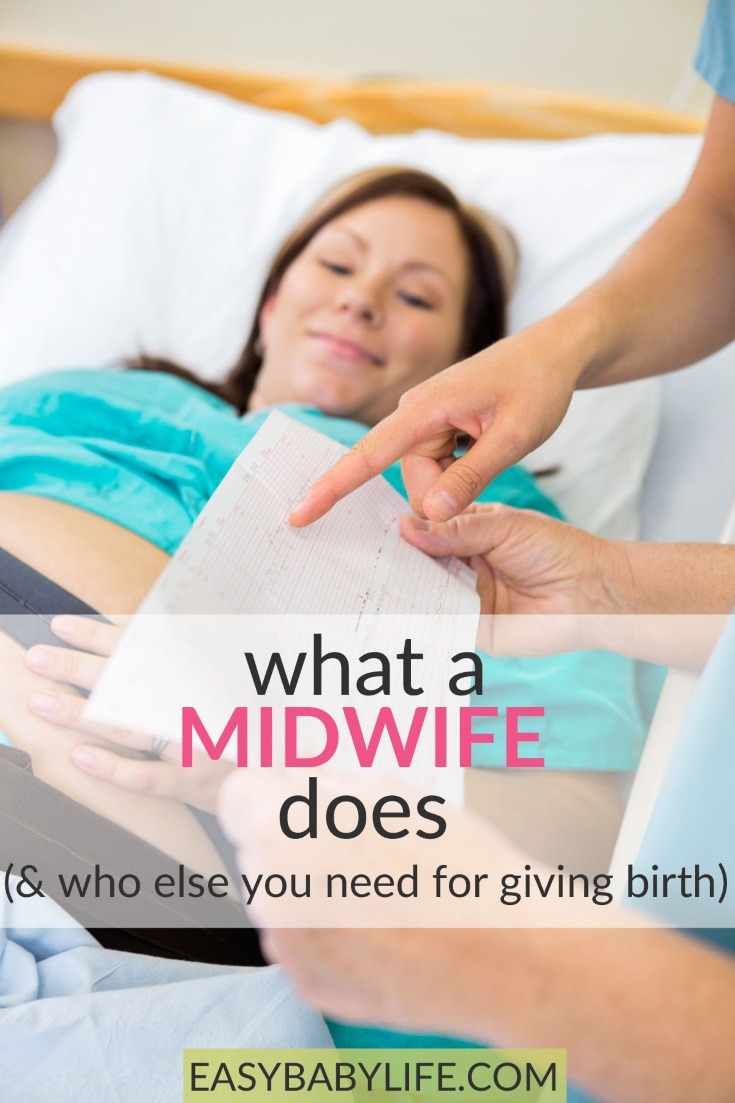
If not before, you will certainly hear about a midwife as soon as you get pregnant. A midwife is simply a person who is trained in assisting with childbirth. Usually, a midwife may also assist with health checkups during pregnancy and sometimes with health checks of both mom and baby after birth.
Well, that is the definition of a midwife. In addition, emotionally, a midwife can be great support both before, during and after childbirth.
Sources indicate that the first record of midwifery goes as far back as the 2nd century, and it is also most likely true that your mom and grandmother had a midwife deliver their children. (The word midwife is very old too – it comes from Middle English: mid = “with” and Old English: wif = “woman”, som midwife actually means “with woman”.) :-)
So, what are midwives and do you need one?
What midwives do (and don’t)
- What does a midwife do?
- Do I need a midwife?
- Midwife or doctor?
- Midwife or doula?
- Midwife visit video
- Learn more
What does a midwife do?
A midwife is someone who provides support during the labor and delivery process. If there are complications, the midwife calls the hospital or doctor. Unlike midwifery in the earlier centuries, today it has become a field of practice among women who seek accreditation and formalized education. Midwives today lend support to the mom before during and after delivery. They do not administer drugs but follow the normal birthing procedures, such as water births.
Since midwifery is becoming more popular for home birthing, there are now two types of midwives: direct entry and nurse-midwives. What is the difference?
Direct entry midwives receive certification after training, whereas nurse-midwives complete a set of requirements; graduate from a university which has a midwifery education program; and complete a national certification exam. In addition, they must also have a BA degree. The certified nurse-midwife must complete an accredited nursing program; become licensed as a registered nurse; and complete a program in nurse-midwifery from an accredited institution.
Do I need a midwife?
Do you need a midwife? It depends on how you want your child delivered. If you prefer a home birth or water birth, certainly a qualified midwife can assist you. However, when choosing a midwife, ensure she has the proper credentials; has been a midwife for a number of years; and ask many questions regarding her role and how she views midwifery. You can tell a lot about a person when you ask them about the field they are in and their experiences. In addition, you need to check with your insurance company to ascertain if they cover you for home births as well as a midwife.
Midwives today are more educated and more in tune with what a mom needs during the labor and delivery process. It is up to you to decide if this avenue is one you wish to explore further.
For a hospital birth, a midwife is likely to be around whether you like it or not. That doesn’t mean that she (or he) will be with you all the time, but it means that a properly trained person is available if and when you need it.
Midwife or doctor?
In general, if you are healthy and there are no reasons to believe that the pregnancy or childbirth can be complicated, you can certainly aim for a midwife to be your primary source of help. However, if you have any medical conditions or if you expect twins or higher multiples, then you definitely need to be in contact with an obstetrician. So use your common sense and take no chances. If you are uncertain, at least pay one visit to an obstetrician.
Again, in the hospital, you’ll have no choice. A doctor will be around somewhere if needed.
Midwife or doula?
Doulas have become increasingly popular, but what is the difference between a doula and a midwife and do you need both?
Well, there is a clear difference as a doula does not provide any kind of medical care. For instance, she would not listen to the baby’s heartbeat or do a vaginal exam or deliver the baby. Instead, she would provide emotional and physical support for the laboring woman and her family and/or postpartum care of the mother and baby.
So if you have a very caring midwife, you can probably do without a doula. But if you also want the person helping you to be able to check on you and your baby, you need a midwife rather than a doula. A doula, on the other hand, is there for you, supporting you throughout the process and many studies indicate that the moms remember the birthing as a more positive experience with a doula around. You can read more about doulas and whether to hire one here.
Midwife visit video
For an example of a midwife visit during pregnancy, have a look at the video below.
Learn more
If you want more information to help plan for your childbirth, check out any of these books. (The links go to Amazon for more information and reviews.)
- The Doula Book: How a Trained Labor Companion Can Help You Have a Shorter, Easier, and Healthier Birth
- The Birth Partner A Complete Guide to Childbirth for Dads, Doulas, and All Other Labor Companions
- The Mindful Mom-To-Be: A Modern Doula’s Guide to Building a Healthy Foundation from Pregnancy Through Birth
Now you hopefully have enough midwife information to get you started with planning for your childbirth. Good luck! If you want to read other mothers’ birth stories, here is the place to go.

Paula Dennholt founded Easy Baby Life in 2006 and has been a passionate parenting and pregnancy writer since then. Her parenting approach and writing are based on studies in cognitive-behavioral models and therapy for children and her experience as a mother and stepmother. Life as a parent has convinced her of how crucial it is to put relationships before rules. She strongly believes in positive parenting and a science-based approach.
Paula cooperates with a team of pediatricians who assist in reviewing and writing articles.






